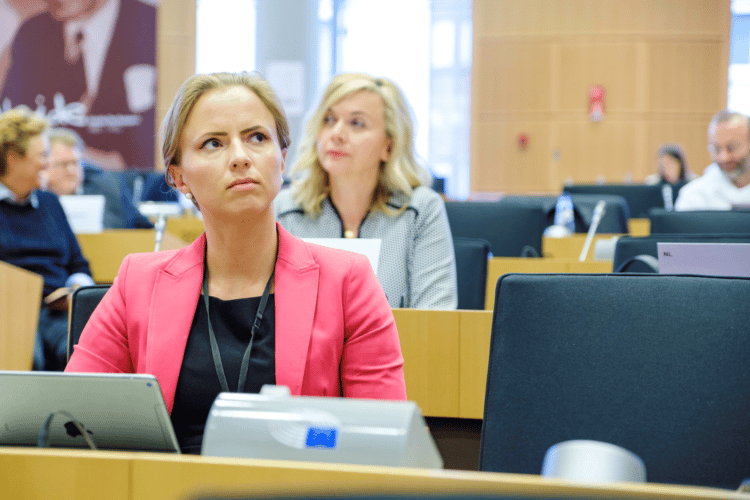
‘Impossible to ignore snus’ in EU’s beating cancer plan: Swedish MEP
Swedish MEP Sara Skyttedal remains critical of the European Commission’s continued unwillingness to recognise the potential for snus and other harm reduction alternatives for reducing tobacco-related mortality as part of the EU’s beating cancer plan.
Work on the EU’s plan for beating cancer continues ahead of a European Parliament vote on amendments planned for December 6th. One of the plan’s main priorities is to “ensure that less than 5% of the population uses tobacco by 2040”.
Swedish MEP Sara Skyttedal is among the many critics who are unhappy that the EU’s plan fails to differentiate between the potential harms of snus and cigarettes.
Criticism of the EU’s beating cancer plan
Earlier this year, the Christian Democrat politician made headlines when she expressed frustration at how European Commissioner for Health and Food Safety Stella Kyriakides answered her question about changing EU regulations for snus.
Among other things, Skyttedal accused Kyriakides and the Commission of “willful ignorance” when it comes to the science on snus and a general resistance toward harm reduction policies.
Ahead of an important European Parliament vote on amendments to the plan, Snusforumet catches up with the outspoken Swedish MEP to hear her thoughts on the process thus far.
‘Impossible to ignore snus’
“For months, the European Commission has avoided the fundamental question. Namely, addressing the inherent contradiction between their goals for fighting cancer and their view of snus in particular, and their ambiguity toward harm reduction in general,” Sara Skyttedal tells Snusforumet.
“I’ve done what I can to continually point out the obvious in meetings with other decision-makers in different parts of the EU system: If you are serious about doing something about tobacco-related mortality, it’s simply impossible to ignore snus, given what we know about the statistics on tobacco and cancer.”
What is your view of the EU’s beating cancer plan and the measures proposed by the EU thus far?
“When it comes to the issue of tobacco and nicotine, the European Commission remains very vague. They want to revise the Tobacco Products Directive, and they want to use taxation as a tool to reduce smoking in Europe to a level that’s more in line with Sweden’s,” explains Skyttedal.
“But it’s clear that they’re not even considering the possibility of legalizing snus in the EU’s internal market. It’s still difficult for me to understand how the European Commission can claim on the one hand that they want to do everything in their power to fight cancer, including revising tobacco policy, yet on the other hand completely reject the idea of liberalizing regulations for one of the very few products that has shown it can displace cigarettes.”
EU plan against cancer into the next phase
With the work of the European Parliament’s Special Committee on Beating Cancer (BECA) nearing its conclusion. having now begun its work. This should lead to a response to the European Commission’s cancer strategy, and what measures the European Parliament should propose. BECA will vote on its position in December, after which it will probably be considered by the whole European Parliament in January.
“Even in BECA, it seems interest in snus is rather low. On the other hand, there are intense debates about harm reduction. I see that a broader acceptance of harm reduction could eventually change perceptions of snus as well. But that means, sadly, that it’s still several steps, and many years, away. And it remains to be seen where the BECA committee lands on harm reduction,” says Sara Skyttedal.
Can Britain lead the way for the EU?
Why do you think that so many find it difficult to see the connection between Sweden’s low proportion of tobacco-related cancer cases and that Sweden is the only country in the EU that allows snus?
“They see the connection, they’re just not willing to act on it. They’re putting other interests ahead of the fight against cancer, unfortunately. It’s simply hard to come to any other conclusion.”
What is your view on new nicotine products, such as nicotine portions?
“Smoking is the problem. That’s what causes cancer. Products that have the ability to reduce smoking should also be allowed to do so. Anyone who wants to over-regulate this type of product also risks pushing out alternatives that we know have the potential to make people stop smoking. That’s what the battle in BECA is about, and it’s a battle I feel the European Commission has yet to acknowledge.
After Brexit, votes in the UK have been raised to look at harm-minimizing alternatives. How do you think this could affect the EU?
“Brits have always been more open to harm reduction in the debate about tobacco, so now when they are no longer bound by EU legislation, it’s quite natural to see them go in that direction. How that might affect the EU is difficult to predict. Probably not at all in the short term. But if the UK can be held up as a positive example, it’s possible that could have an impact in the longer term,” says Sara Skyttedal.




